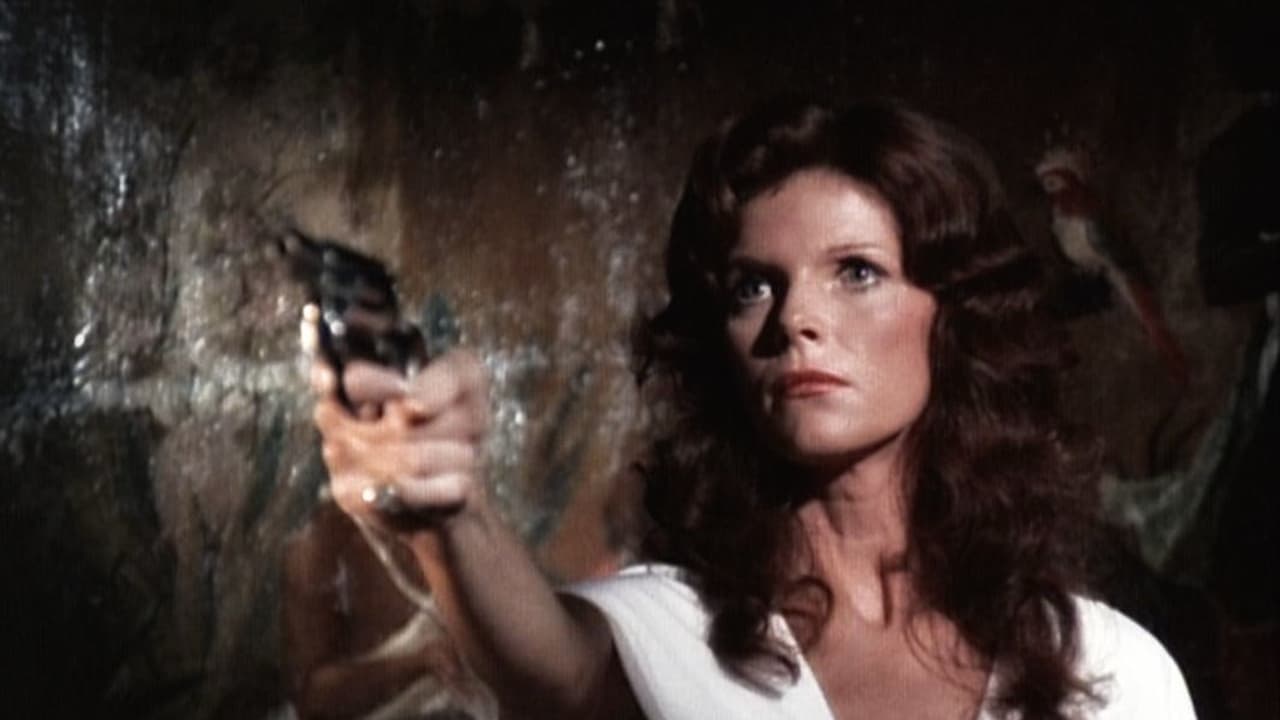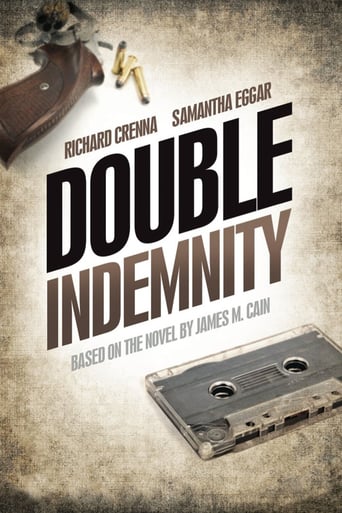



This is a tender, generous movie that likes its characters and presents them as real people, full of flaws and strengths.
View MoreIt's a good bad... and worth a popcorn matinée. While it's easy to lament what could have been...
View MoreThe story, direction, characters, and writing/dialogue is akin to taking a tranquilizer shot to the neck, but everything else was so well done.
View MoreStrong acting helps the film overcome an uncertain premise and create characters that hold our attention absolutely.
View MoreMurder and insurance fraud take an adulterous couple to "the end of the line"...TV was visually vulgar back in the early 1970s and this truncated, made-for-TV knock-off hurt my eyes. It can't possibly compare to the 1944 Billy Wilder Film Noir classic as anyone in their right mind ought to know -sight unseen- but that doesn't mean this update should be seen as a separate entity, either. Although based on the original Paramount screenplay, there's over half an hour cut out and the director's bland indifference makes what's left imminently forgettable. With rare exception, the younger generation wasn't interested in watching old black and white movies on TV back in 1973 (still true today, alas) so this lurid, compelling tale was new to the overwhelming majority of viewers; then as now, ratings rule and cashing in was its only reel raison d'etre. Gus Van Zandt remade Alfred Hitchcock's PSYCHO for similar reasons and if these redux led to the seeking out of the original films or novels, so much the better. I loved the James M. Cain source novel enough to tune in back then and I enjoyed this time capsule curio the second time around for the longish hair, halter tops, turbans, ugly decor, and lush auburn locks of "guest star" Samantha Eggar, who didn't try too hard. In addition to recognizing a few of the incidental cast from a childhood spent in front of the boob tube, Lee J. Cobb was able to hold my interest as a world-weary, tired-looking Keyes but Richard Crenna's affable and inoffensive Walter Neff only reminded me of Bill Bixby on a bad day. Improvement upon the original was, of course, never intended in a rush to make a buck but, instead of a mindless retread, a new adaptation of the novel would have been a novel idea. Cain's book differs somewhat from its celluloid incarnations and the horrific shark fins in the moonlight ending is killer. The completist in me is thankful this speeded up "Me Decade" update was included as part of the DOUBLE INDEMNITY DVD extras but the experience not only made me long to see the original, it had me nostalgic for any episode of the better-made COLUMBO TV series. I also flashed back to a very good 1973 ABC TV Movie Of The Week that I haven't seen since its initial airing: John D. Macdonald's LINDA starring the beautiful Stella Stevens as a ruthless femme fatale who murders her lover's (sexy John Saxon) wife and then frames her mild-mannered husband for the crime and, if I remember correctly, there's also an open-ended ending. Like DOUBLE INDEMNITY, it was needlessly remade with TV movie queen Virginia Madsen as the titular vixen and Richard Thomas as the milquetoast husband.
View MoreI have it on good authority that James M. Cain turned over in his grave when this haphazard rendering of his novella DOUBLE INDEMNITY emanated from the boob tube in the early 1970s. (Seriously, he was 81, and kicked the bucket four years later.) Be that as it may, if you watch both the original and a remake from decades later for the first time because the film studio is making more money on a deluxe DVD set than it would by packaging the original alone, it usually turns out to be a case of a defendant providing the rope with which they should be hoisted up, figuratively speaking. Crass Universal Studios took an earlier effort nominated for seven Oscars, which largely created the genre of film noir, and de-noired it in a sloppy adaptation they probably hoped people would skip to focus on the commercials. Almost every character name and line from the original was retained, no matter how anachronistic. But most of the TV cast is so third-rate that when they change the name of Lola's boyfriend from Nino Zachetti (beyond their powers of pronunciation) to Donny Franklin, airhead Kathleen Cody (as Lola) calls him "Johnny" when he's first introduced. Key lines of dialog are chopped in half, to fit in more TV ads. And Billy Goldenberg's musical score would be more suitable for a situation comedy. Even if this were the first adaptation of Cain's story, it would not come within a hundred miles of an Emmy nomination.
View MoreWhen someone remakes a classic movie, the remake is always unfavorably compared to the original. Also, there's a chance that the remake is so radically different that it is just too unfamiliar to audiences.Well, the 1973 TV version of "Double Indemnity" has almost identical scenes and dialogue as the 1944 original. The main difference is that the remake just seems to have no energy at all. Fred MacMurray was great as the lecherous, leering insurance agent Walter Neff in the original; Richard Crenna just seems world-weary and tired. Edward G. Robinson brought great manic energy to his role as MacMurray's boss Barton Keys; Lee J. Cobb, a fine actor, appears almost bored with the proceedings. Samantha Eggar is all wrong as the conniving, back-stabbing Phyllis Dietrichson; while Barbara Stanwyck was just superb in this wicked role, Eggar is overly polite and mannered and just seems way out of place.Robert Webber, in the old Richard Gaines role as Robinson's boss Norton, and John Fiedler taking the Porter Hall role as the crucial witness, bring some life to the movie. In particular, Webber recreates the Norton role well in a 1970s context.However, after the movie starts, the whole thing just sort of lies there, without any life or electricity. This is one film that never should have been remade.
View MoreThis 1973 TV remake of the Billy Wilder classic is inferior to the original. Surprise!First, the good things. Lee J. Cobb makes a terrific Barton Keyes. He's not as good as Edward G. Robinson, of course, but he's the only reason to watch this. This remake's only improvement over the original is that it cuts down the role of Lola Dietrichson, the step-daughter of the femme fatale, Phyllis Dietrichson.And that's it for the good things.The bad things are many. The director records everything in an indifferent manner: if you watched the film with the sound muted you'd hardly get the impression that anything especially interesting was happening. Because of modern bad taste, the film must be in color instead of black and white. Because of 1970s bad taste, all the sets are distractingly ugly. Walter Neff's expensive apartment, in particular, is hideous.The modern setting hurts in a lot of small ways. Train trips were a bit more unusual in the 70s than in the 40s, so Mr. Dietrichson's decision to take a train seems more of a contrivance. Men stopped wearing hats, which prevents Walter from covering up his brown hair while posing as the white-haired Mr. Dietrichson. Women in mourning stopped wearing veils, which robs Samantha Eggar of a prop Barbara Stanwyck made splendid use of in a key scene. (Oddly, Lola still has the line where she reveals that her stepmother was trying on a black hat and veil before she had need of them.)Stephen Bochco keeps much of the Billy Wilder-Raymond Chandler script the same. But he makes a lot of tiny, inexplicable changes to the dialogue which leave the script slightly flabby where once it was lean and muscular. Outrageously, the famous motorcycle-cop banter is gone, but look closely and you'll see what looks like a post-production cut where those lines should have been. Bochco may not be to blame.Richard Crenna is passable as Walter Neff. What might have made this version tolerable is a really splendid Phyllis Dietrichson. Instead we get Samantha Eggar, who comes off like a standard-issue villainess from "Barnaby Jones." But who can blame Eggar? With a director who barely seems interested in what's happening in front of the camera, how could Barbara Stanwyck herself have come off well?
View More